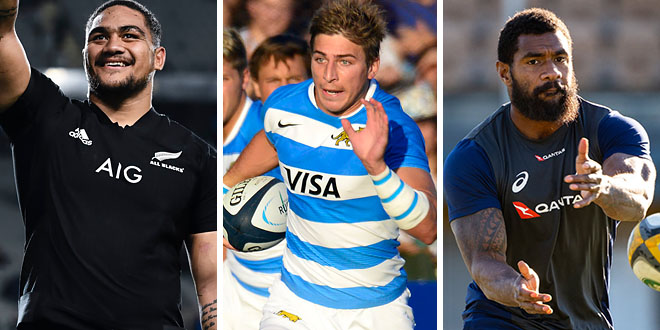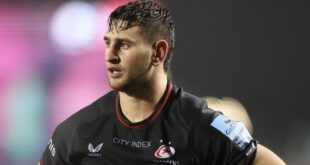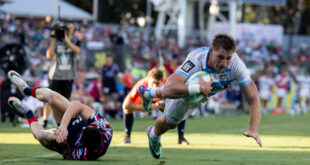This article addresses the rosters of Argentina, Australia, New Zealand and South Africa in the annual Rugby Championship. It documents who are the Foreign-Born and / or raised players, how they qualify and if they have prior affiliation to another union.
This article may provide the reader with information of how players born outside of a country came to represent unions and the means to determine objective views on World Rugby player eligibility laws.
Players are granted eligibility by meeting Regulation 8 as outlined by World Rugby. This can be achieved in one of three ways: (a) a player’s country of birth; (b) a country where one parent or grandparent was born; or (c) by completing three years of consecutive residency immediately before representative duty.
The three means of qualifying via World Rugby eligibility rules do not require a player to have citizenship nor carry a passport of the relevant country. Veteran Wallaby Quade Cooper is an example.
Awkward moment @ausgov refuse your citizenship applications (again)
wearing the green and gold 70 times apparently is not enough these days..
Cheers Shannon pic.twitter.com/jMSa1moWsA— Quade Cooper (@QuadeCooper) July 13, 2021
There were 130 Foreign-Born players at RWC 2015. The number increased to 144 for RWC 2019. In between the two tournaments World Rugby made it more difficult for players to qualify on residency. The law was extended by two years from three to five years residency. This was set to begin at the end of 2020; however, World Rugby decided to extend it by twelve months.
The change from three to five years residency was officially motivated by the number of foreign-born adult players at RWC 2015 and the subsequent qualifying of additional adult players in 2016 and 2017.
AUSTRALIA (11)
Australia’s roster contains eleven players born abroad. There are two varieties: (a) players who arrived young to be developed by Australian rugby; (b) players who were not developed primarily by Australian rugby. Seven are New Zealand born, Australian raised players. Quade Cooper, Lalakai Foketi, Noah Lolesio, Brandon Paenga-Amosa, Duncan Paia’aua, Lukhan Salakai-Loto, and Jordan Uelese moved to Australia as children. They were developed by the Australian rugby system. Marika Koroibete, Hunter Paisami, and Taniela Tupou were not developed primarily by Australian rugby. Koroibete is eligible despite having played for Fiji at the Rugby League World Cup. Paisami was born in Samoa and raised in New Zealand. He moved to Australia at the age of 17.
| PLAYER | POS | BIRTH COUNTRY | ELIGIBILITY | OTHER REP. |
| Brandon Paenga-Amosa | HK | New Zealand | Residency (2002) | – |
| Jordan Uelese | HK | New Zealand | Residency (2011) | – |
| Taniela Tupou | TH | Tonga | Residency (2017) | Tonga u15 |
| Lukhan Salakaia-Loto | LO | New Zealand | Residency (2012) | – |
| Isi Naisarani | N8 | Fiji | Residency (2019) | – |
| Quade Cooper | FH | New Zealand | Residency (2004) | – |
| Noah Lolesio | FH | New Zealand | Residency (2013) | – |
| Lalakai Foketi | CE | New Zealand | Residency (2011) | – |
| Duncan Paia’aua | CE | New Zealand | Residency (1998) | – |
| Hunter Paisami | CE | Samoa | Residency (2018) | Samoa u20 |
| Marika Koroibete | WI | Fiji | Residency (2015) | Fiji Rugby League |
NEW ZEALAND (7)
Seven members of the All Blacks’ roster were not born in New Zealand. Akira Ioane was born in Japan to New Zealand parents who returned home to New Zealand. His father, Eddie Ioane played for Samoa at RWC 1991. Ofa Tu’ungafasi’s father, Mofuike Tuʻungafasi played for Tonga. Unlike Eddie Ioane, Mofuike Tuʻungafasi was born and raised in the Pacific Islands. Ofa Tu’ungafasi moved to New Zealand at the age of 14. Shannon Frizzel and Samisoni Taukei’aho earned scholarships to play in New Zealand following tours to the country while playing for Tonga at junior levels. Tyrel Lomax was schooled in both Australia and New Zealand. Sevu Reece completed his schooling in New Zealand. Ireland were interested in capping Reece via three years eligibility. He signed for Connacht in 2018 but never moved due to a guilty charge of domestic violence.
| PLAYER | POS | BIRTH COUNTRY | ELIGIBILITY | OTHER REP. |
| Ofa Tu’ungafasi | LH | Tonga | Residency (2009) | – |
| Samisoni Taukei’aho | HK | Tonga | Residency (2017) | Tonga u15 |
| Nepo Laulala | TH | Samoa | Residency (2007) | – |
| Tyrel Lomax | TH | Australia | Parent | Australia u20 |
| Shannon Frizell | FL | Tonga | Residency (2017) | Tonga u20, Tonga u17 Soccer |
| Akira Ioane | FL | Japan | Parent | – |
| Sevu Reece | WI | Fiji | Residency (2017) | – |
ARGENTINA (1)
Sebastián Cancelliere was born in California to Argentine parents. His mother was pregnant with him upon arrival in the USA. His father moved to the USA for work in 1993. The family returned to Argentina in 1994. He learned his rugby in Buenos Aires at the Hindú Club. He went through the Argentine High Performance system.
| PLAYER | POS | BIRTH COUNTRY | ELIGIBLITY | OTHER REP. |
| Sebastián Cancelliere | WI | USA | Parent | – |
SOUTH AFRICA (0)
All of South Africa’s players were born and raised domestically.
 Americas Rugby News Rugby news from across the Americas!
Americas Rugby News Rugby news from across the Americas!






